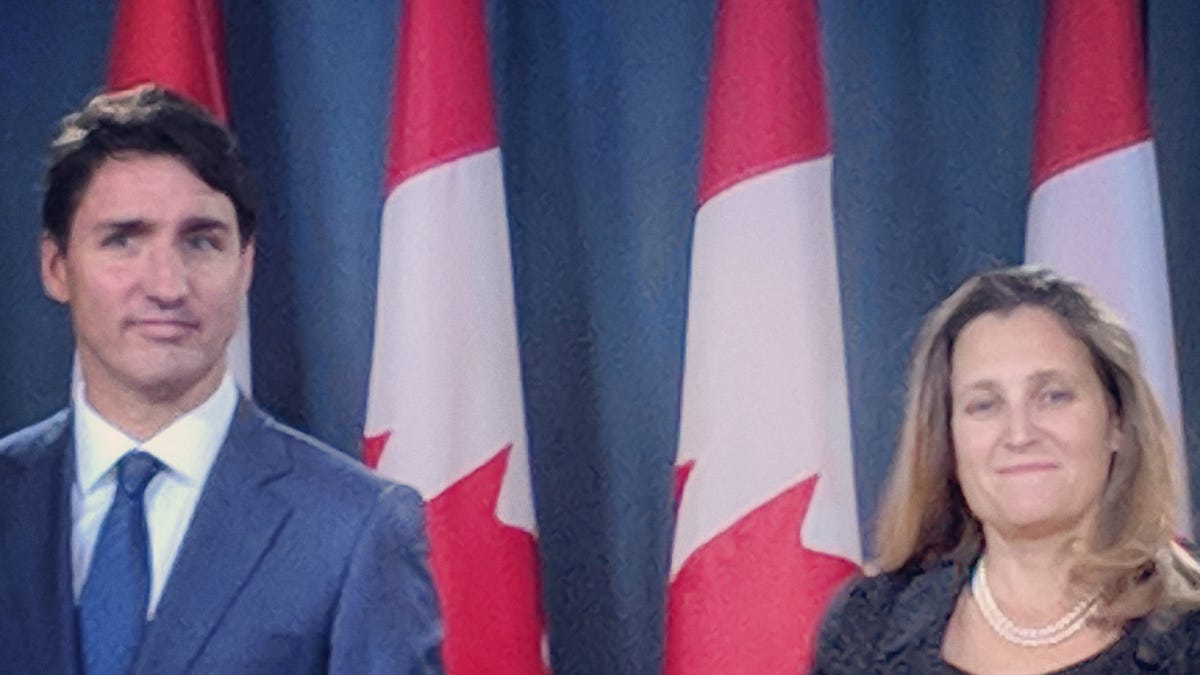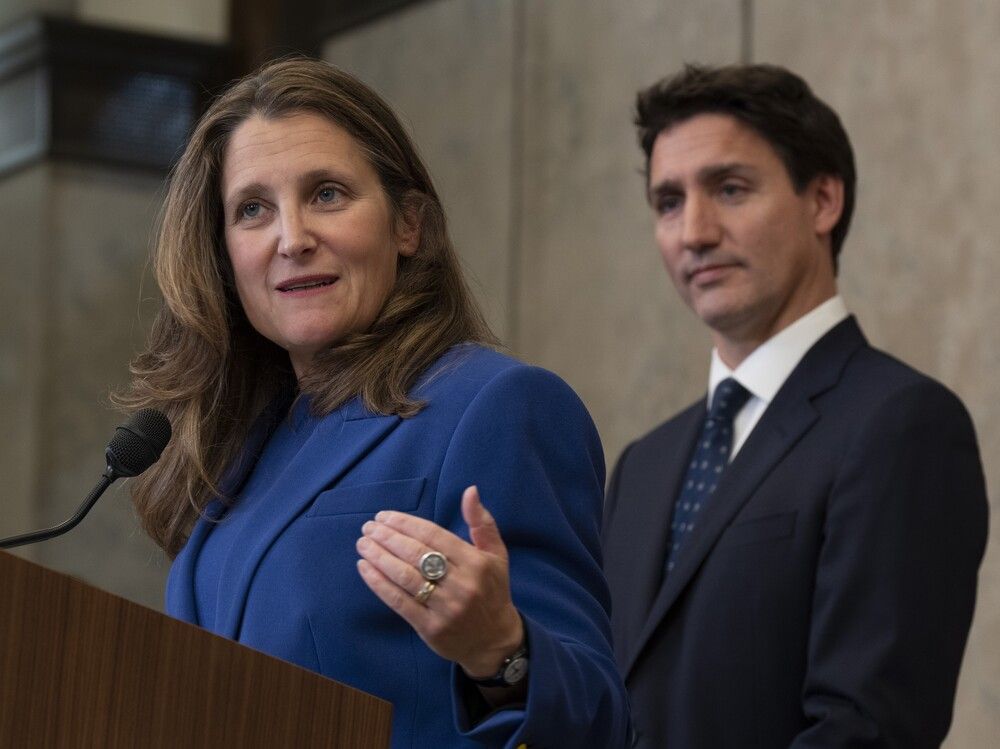You are using an out of date browser. It may not display this or other websites correctly.
You should upgrade or use an alternative browser.
You should upgrade or use an alternative browser.
Trudeau Popularity - or not (various polling, etc.)
- Thread starter daftandbarmy
- Start date
- Reaction score
- 6,438
- Points
- 1,260
From Paul Wells. More on some Liberals’ worries about what their loosey-goosey leadership rules could mean.

 paulwells.substack.com
paulwells.substack.com

The Second Finance Ministers Club
Notes on a capital city in slightly-amused shock
4. After Trudeau
Say he quits. What next?
Here’s something I’m starting to hear from Liberals. I don’t believe I’m the first to write about it, but it hasn’t received enough attention yet.
Can the party ensure the legitimacy of its leadership succession process?
I suspect some large number of the presumed candidates for his succession won’t run. They haven’t exactly been a bold lot so far. But assume for the sake of argument that there are four or five candidates, and none has an insurmountable advantage.
The Liberal Party transformed its leadership-selection process for the 2013 race: preferential vote among “supporters.” Supporters didn’t need any record of involvement with the party, didn’t need to pledge any support, didn’t need to pay a dime in return for voting rights. Whee! Populist rush: 300,000 people registered as supporters, 130,000 voted. Trudeau won overwhelmingly on the first ballot. Of course: he was the only candidate most people voting in the contest had ever heard of.
After a big defeat, or with such a defeat looming, figure far less than half as many people would be involved next time. Say, very generously, 40,000 supporters.
How hard would it be to rig that contest for mischievous purposes or worse? Probably not hard enough. In a vote open to every random “supporter,” it would take only a few thousand, or tens of thousands, of supporters to capture a major national political party for any cause or faction that might want one.
I traded emails with a former senior Liberal organizer about all this today. Without prompting, this veteran of many leadership contests mentioned the need to “ensure… that groups not Liberal-friendly are not organizing to disrupt the democratic process within the Party.” Those groups could include supporters of one side in the Israel-Hamas dispute. Or proxies for a hostile regime. Or pro-life or anti-MAID or anti-vaccine groups. Or practical jokers: Could the process as currently constituted block a write-in campaign for Doris Day?
- Reaction score
- 3,638
- Points
- 1,040
I mean it’s only 1500$ a person in Canada, no biggie.I have noticed that the timing of the announcement meant that no one is talking about a $61B deficit.
Perhaps that was the plan - if not, it is certainly a bonus
Calling it Vancouver is a bit of a stretch. I know people who live there and they wouldn’t say they live in Vancouver, since it’s an hour outside of the City of Vancouver.
cant even win in the big cities anymore. Vancouver/Toronto/Montreal
However, it is in an urban-ish area because of all of the construction in the last few decades. But some people still have horses and there is a rodeo in Cloverdale.
The turnout, in total, was also abysmal.
now now - “done more” doesn’t necessarily mean positive thingsHope you keep saying that if/when prices rise, people get laid off, the economy slowing down & a drop in the Canadian dollar if/when 25% across-the-board tariffs hit - or will all that be Trudeau's fault?
Halifax Tar
Army.ca Legend
- Reaction score
- 18,013
- Points
- 1,260
My bet is that Trudeau will use this six week break to allow things to cool off, he'll do a cabinet shuffle and try a big reset. He'll use the fear of Trump, 25% tariffs, foreign interference to try and continue to paint PP as some sort of maple maga. Follow that up with more free money, universal income to try and reverse things. Too many cowards in his party, he's not going anywhere.
I think you're right. But I don't think it will have any effect.
Hope you keep saying that if/when prices rise, people get laid off, the economy slowing down & a drop in the Canadian dollar if/when 25% across-the-board tariffs hit - or will all that be Trudeau's fault?
I think we're past the point of being able to get ahead of this. We should have had an election last summer and set ourselves up to bargain with Trump. And start making the changes needed to be a good neighbor and partner in defense.
Now we're stuck with a lame duck Gov that has a leader who is closer to dictator than PM in is unwillingness to leave.
I think Trudeau put this country on a course for tough economic times by not holding an election last summer, and now we're in for heavy seas.
I think much of the Liberals’ current unpopularity is solely based on Trudeau’s unpopularity. If he leaves, I expect to see a lot of the Liberals’ support to come back, no matter who they pick for leader.
There is still a lot of mythology that they are “centrist” by the majority of voters who don’t pay attention to politics.
I think that's more your want and desire than an a prediction.
Halifax Tar
Army.ca Legend
- Reaction score
- 18,013
- Points
- 1,260
- Reaction score
- 7,625
- Points
- 1,360
That we've heard out loud so far.... There has been minimal conversation about the policies being wrong from the LPC caucus ...
Oh, I meant "more of" for sure. Mind you, with Trump at the helm in the south, and PP at the helm here, there'll be past management on both sides to blame, but just warning to be careful what one wishes for.now now - “done more” doesn’t necessarily mean positive things
Maybe over time, but it would depend how much time would be available. I can't find it at my fingertips, but I've seen polling showing party fortunes continuing to stay low even if PMJT scoots.I think much of the Liberals’ current unpopularity is solely based on Trudeau’s unpopularity. If he leaves, I expect to see a lot of the Liberals’ support to come back, no matter who they pick for leader ...
As for current polling, this almost literally hot off the presses ...
Politics in Canada – Justin Trudeau News – CTV News
Today's political news, including the latest on Prime Minister Justin Trudeau, Pierre Poilievre, Jagmeet Singh, Canada's federal elections, government policies and more.
ArmyRick
Army.ca Veteran
- Reaction score
- 3,714
- Points
- 1,040
My theory, only a theory, the people who didn't show up are the hard left who are completely disenfranchised with Trudeau and Singh. These are the folks so fed up with these two that they simply don't vote.The turnout, in total, was also abysmal
Personally I am against this line of thinking. Always vote. Even if you check off and independent. Or a relatively unknown party.
By elections generally have low turnout, and with a general election coming soon, disengagement was probably even higher.
Yeah, calling Cloverdale-Langley Vancouver would be like calling Smiths Falls Ottawa. It’s growing significantly though, as you say.
Calling it Vancouver is a bit of a stretch. I know people who live there and they wouldn’t say they live in Vancouver, since it’s an hour outside of the City of Vancouver.
However, it is in an urban-ish area because of all of the construction in the last few decades. But some people still have horses and there is a rodeo in Cloverdale.
Yeah, calling Cloverdale-Langley Vancouver would be like calling Smiths Falls Ottawa. It’s growing significantly though, as you say.
Oldgateboatdriver
Army.ca Fixture
- Reaction score
- 4,594
- Points
- 1,010
We need a one term Rhinoceros Party government!
Come to think of it, they are probably the only ones who could deal with the Donald ... by keeping him off balance at all time.
Come to think of it, they are probably the only ones who could deal with the Donald ... by keeping him off balance at all time.
- Reaction score
- 2,320
- Points
- 1,260
I don't think that the voter turnout has anything to do with support for either the Liberal Party or the NPD.
I think it is more of a reflection of Canadian society, we don't care. Maybe it is a case of thinking that outside of the major cities (Toronto, Montreal, and Ottawa), your votes don't matter or they are just not interested in one party over the other, they all suck, I don't know but you see low voter turnout in almost all elections at all levels these days.
I think it is more of a reflection of Canadian society, we don't care. Maybe it is a case of thinking that outside of the major cities (Toronto, Montreal, and Ottawa), your votes don't matter or they are just not interested in one party over the other, they all suck, I don't know but you see low voter turnout in almost all elections at all levels these days.
- Reaction score
- 6,438
- Points
- 1,260
More like my fear.I think that's more your want and desire than an a prediction.
- Reaction score
- 6,858
- Points
- 1,260
National Post giving a very good summary of why we shouldn't be crying over 3 former Cabinet Ministers and their previous decisions to quit cabinet. It was a very nice refresher on why they don't necessarily deserve our pity.

 nationalpost.com
nationalpost.com

Jamie Sarkonak: Chrystia Freeland is no martyr for women
The same goes for Jane Philpott and Jody Wilson-Raybould
- Reaction score
- 11,886
- Points
- 1,160
National Post giving a very good summary of why we shouldn't be crying over 3 former Cabinet Ministers and their previous decisions to quit cabinet. It was a very nice refresher on why they don't necessarily deserve our pity.

Jamie Sarkonak: Chrystia Freeland is no martyr for women
The same goes for Jane Philpott and Jody Wilson-Raybouldnationalpost.com
Great reminders of Freeland's scrotbag behavior, including violating the constitutional rights of Canadians.
She deserves the ignominy of being fired over zoom and certainly is no martyr.
PrairieFella
Army.ca Veteran
- Reaction score
- 3,813
- Points
- 1,110
I read that some analysts think the CP strike had an effect since voter information cards could not be distributed.By elections generally have low turnout, and with a general election coming soon, disengagement was probably even higher.
Yeah, calling Cloverdale-Langley Vancouver would be like calling Smiths Falls Ottawa. It’s growing significantly though, as you say.
Halifax Tar
Army.ca Legend
- Reaction score
- 18,013
- Points
- 1,260
I'm hearing JT has fled, err, I mean gone on vacation in Hawaii...
- Reaction score
- 22,763
- Points
- 1,010
With the exchange rate currently like it is?I'm hearing JT has fled, err, I mean gone on vacation in Hawaii...
You have it right. He’s also cancelled all end of year interviews with media.I'm hearing JT has fled, err, I mean gone on vacation in Hawaii...
- Reaction score
- 22,763
- Points
- 1,010
A bit of irony in Trudeau hiding out in the USA…
Similar threads
- Replies
- 558
- Views
- 292K
- Replies
- 15
- Views
- 51K



